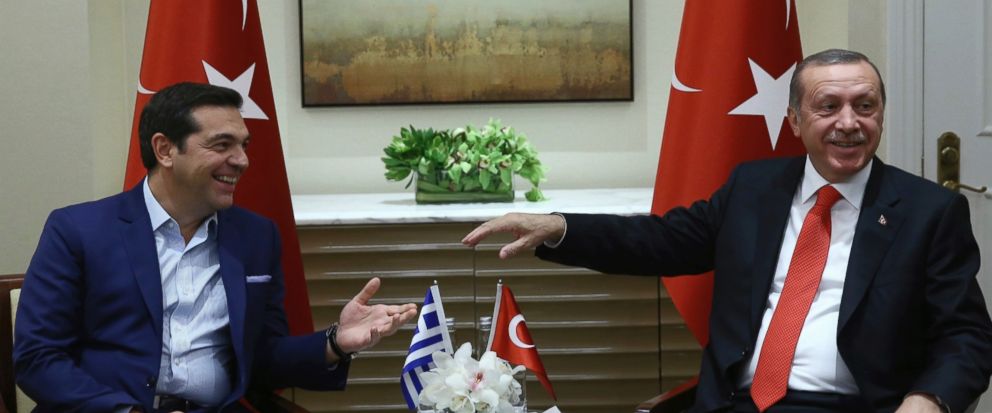Turkey's Erdogan arrives in Athens for official Greece visit
Recep Tayyip Erdogan arrived in Athens Thursday for the first official visit to Greece by a Turkish president in decades, with Greece hoping the trip will help improve often frosty ties with its neighbor and NATO ally.
Erdogan was greeted by an honor guard at the airport and headed to central Athens, laying a wreath at the Tomb of the Unknown Soldier before talks with Greek Prime Minister Alexis Tsipras and other officials. On Friday, he travels to northeastern Greece to meet with members of the country's Muslim minority.
Security was tight in the Greek capital, with roads shut down and demonstrations banned in the center of Athens.
On the eve of his arrival, Erdogan alarmed Greek officials by saying in an interview with Greece's Skai television that the 1923 Treaty of Lausanne, which determined current Greek-Turkish borders among other issues, should be "updated."
"In fact, all agreements (pacts) in the world should be updated with the passage of time," Erdogan said in the interview. "Lausanne too, in the face of all these developments, is in need of an update. This update would be beneficial not only for Turkey but also for Greece."
Erdogan has made similar comments in the past about the peace treaty, which set the borders of modern Turkey, but his repetition on the day before his arrival in Athens came as an unwelcome surprise to his hosts.
His comments "raises serious concerns and questions," Greek government spokesman Dimitris Tzanakopoulos said in a statement.
"The Greek government and the prime minister want his visit to be a reason to build bridges, not to raise walls."
Tzanakopoulos said respecting the treaty is "the exclusive and non-negotiable foundation on which the honest cooperation of the two countries can be built."
"Comments regarding its revision do not contribute to the climate we are trying to build in our relations and in the region," he said.
The refugee crisis will be high on the agenda of talks with Erdogan, as Greek islands have been the gateway into Europe for migrants crossing from the Turkish coast. Regional relations, energy and business ties, Turkey's stalled bid to join the European Union and longstanding disputes such as Turkey's territorial claims in the Greek Aegean will also be discussed.
One of the current thorny issues to be raised will be the case of eight Turkish servicemen who have requested asylum in Greece following last year's failed coup in Turkey. Ankara has demanded their extradition, a request rejected by Greek courts on the grounds they could not be guaranteed a fair trial in Turkey.
The move infuriated Erdogan, who said in his Wednesday interview that his country's judicial system is "the best in Europe." He said Tsipras had promised to return the servicemen in "15 to 20 days" after they flew to Greece in a military helicopter.
"That is what he said. But unfortunately right now they are still in Greece," Erdogan said, adding that the servicemen should have been handed over before Greek courts became involved.
"If you leave it up to the judiciary there will be no result," he said. "In order to facilitate the work of the judiciary you must first, as the government, take the necessary measures before you assign it to the judiciary."
Erdogan's visit comes as his country finds itself increasingly isolated on the international stage, and his comments will be closely watched for signs he might try to improve some of Turkey's international relations, particularly with the EU.
Turkey's ties with the EU, and with several European countries, deteriorated significantly following Erdogan's post-coup crackdown. Tens of thousands of Turks have been fired from their jobs, and tens of thousands more have been imprisoned on accusations of being linked, however tenuously, with Fethullah Gulen, the U.S.-based Islamic cleric that Erdogan blames for masterminding the coup.
Other than Greece, Poland is the only other EU country to have invited Erdogan to visit since mid-2016.
Historical tensions between Greece and Turkey, which have brought the two countries to the brink of war on three occasions since the 1970s, remain. Decades-old thorny issues include territorial disputes in the Aegean, the Muslim minority in northeastern Greece and the continued occupation by Turkish troops of northern Cyprus.
Tension between Ankara and Washington has also increased recently, particularly over the New York trial of a Turkish banker over alleged transactions with Iran. Earlier in the week, Erdogan described the trial of Mehmet Hakan Atilla as an American conspiracy to blackmail and blemish his country.
- Star
Add Interests Customize your news feed by choosing the topics that interest you.
To save your interests across all devices Log In or Sign Up »Source – abcnews.go.com

